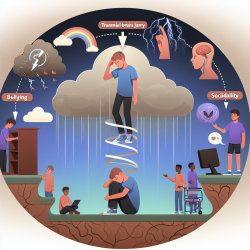Introduction
As practitioners in the field of speech-language pathology, it is crucial to continuously seek ways to enhance our understanding and improve the outcomes for the children we serve. A recent study titled "Time of Day and Sleep Deprivation Effects on Risky Decision Making" offers valuable insights into how sleep deprivation and circadian rhythms influence decision-making processes. This blog will explore the implications of these findings for practitioners working with children, particularly in the context of online therapy services like those provided by TinyEYE.
The Study: Key Findings
The study conducted by Ruiz-Herrera et al. (2024) investigated the effects of sleep deprivation and circadian rhythms on risky decision-making using the Balloon Analogue Risk Task (BART). Thirteen participants underwent a 39-hour constant routine protocol, remaining awake in controlled conditions while performing the BART every two hours. The results indicated significant variations in decision-making performance based on the time of day and the level of sleep deprivation.
- Time of Day Effects: The study found that participants exhibited a greater propensity for risk around midday before experiencing sleep deprivation. This suggests that decision-making processes are influenced by circadian rhythms, with certain times of the day being more conducive to taking risks.
- Sleep Deprivation Effects: After 29.5 hours of being awake, participants showed a lower risk propensity, indicating that sleep deprivation significantly impacts decision-making abilities. Reaction times were slower in the morning hours following sleep deprivation, highlighting the cognitive impairments associated with lack of sleep.
Implications for Practitioners
Understanding the relationship between sleep deprivation, circadian rhythms, and decision-making is crucial for practitioners working with children. Here are some key takeaways and strategies for implementation:
- Schedule Considerations: When planning therapy sessions, consider the time of day. Midday sessions might be more effective for tasks requiring decision-making and cognitive engagement. Avoid scheduling demanding tasks in the early morning, especially if the child has experienced sleep deprivation.
- Sleep Education: Educate parents and caregivers about the importance of adequate sleep for their children's cognitive development and decision-making abilities. Encourage consistent sleep schedules to support optimal cognitive functioning.
- Monitor Sleep Patterns: Incorporate questions about sleep patterns into initial assessments and ongoing evaluations. Understanding a child's sleep habits can provide valuable context for their performance during therapy sessions.
- Further Research: Encourage practitioners to stay informed about the latest research on sleep and cognitive functioning. Consider conducting your own studies or collaborating with researchers to explore the impact of sleep on specific speech and language outcomes.
Conclusion
The study by Ruiz-Herrera et al. underscores the importance of considering sleep patterns and circadian rhythms when working with children. By integrating these insights into practice, practitioners can enhance their ability to support children's cognitive development and decision-making skills. For a deeper understanding of the research, practitioners are encouraged to read the original study: Time of Day and Sleep Deprivation Effects on Risky Decision Making.










